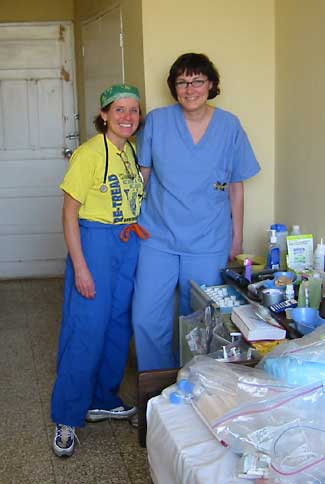A glass of rum welcomes all visitors to the Dominican Republic, a Spanish-speaking nation in the Caribbean that is blessed with pristine beaches, warm weather and an easygoing atmosphere. The capitol, Santo Domingo, is an old city abuzz with activity.

“It’s chaotic, it’s like a circus,” says Rebecca Pettengill, the administrative assistant in charge of membership services and budget management at the U-M-Flint Recreation Center.
Pettengill knows the Dominican Republic well. After all, she has visited the country annually for the past five years and left Feb. 18 for her sixth trip. But she’s not on spring break hanging out at the beaches.
Instead, she’s working as a volunteer translator for a medical mission that provides care for people in the city of San Pedro de Macoris, 40 minutes from the capitol.
It was while Pettengill was working at the University’s development office that she met Professor Maureen Tippen. The professor takes two or three students in the University’s international nursing course to go with the Midwest Medical Mission of Toledo, Ohio, to the Dominican Republic. When the faculty translator wasn’t able to go six years ago, Tippen invited Pettengill to join them.
“I have been told I can consider myself fluent with grammatical errors in Spanish,” Pettengill says. “I minored in Spanish at U-M-Flint and had the opportunity to study abroad in Costa Rica for four weeks.”
While in Costa Rica, Pettengill lived with a family that didn’t speak any English and she was forced to speak only Spanish.
“It made me realize my potential,” she says. “I had to work so hard to learn Spanish.”
The mission usually lasts for four days. The U-M-Flint group holds a packing party just prior to the trip. Each person brings a 70-pound duffel bag full of medicine, vitamins and medical supplies that people have donated.
At San Pedro de Macoris, a typical day sees the group of more than 20 U.S. volunteers waking up to a cold shower before boarding the bus to the hospital at 8 a.m. More often than not, a crowd already will be waiting, and the hospital staff has to make an effort to control the influx of people.
The doctors perform operations in the surgical unit while Pettengill, Tippen and others from the Mission work in the clinic.
“In the four days we will see 900 to 1,200 children and adults,” Pettengill says. “I fill out intake forms for all the patients and go between the local practitioners and American volunteers helping to translate as needed. I also explain to the patients how they have to take their medicine.”
For the mission, Pettengill not only has to volunteer her time, she also has to pay her own way. But she finds it a meaningful cause. Many people in the Dominican Republic are poor, and the lack of sanitary water and sewers contributes to many unnecessary illnesses. Pettengill says parasites, fungus and infections are the most common problems they treat.
“Once you go and see the need of the people, most of them can’t afford what we consider basic necessities, such as toothpaste and a toothbrush. It’s a wonderful experience to be able to help them,” she says. “I hope we show the Domincan people that other people care about them.”

